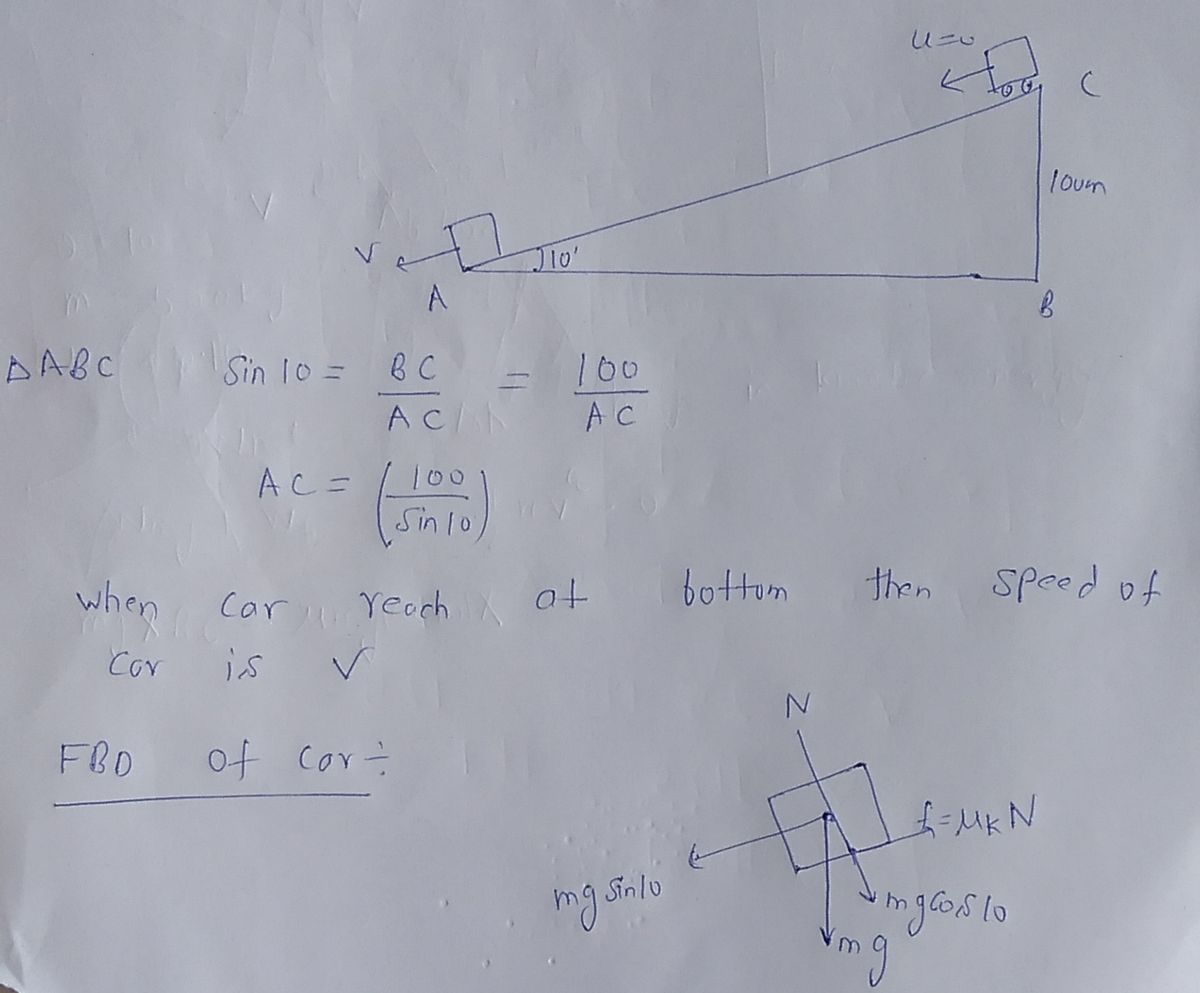At its steepest, Escalante Drive has an angle of about 10°. On a particularly icy day, the coefficient of kinetic friction between the tires of your car (m = 500 kg) and the road is 0.10. You %3D were trying to drive up the hil! when your car began to slide. If you were 100 m up the hill when the car started going backwards, how fast will you be going when you reach the bottom? Use the following assumptions: The car begins sliding down the hill from rest (but ignore any effects of static friction) The coefficient of friction is the same everywhere on the hill The car slides with the wheels completely locked up (no rolling) The car slides in a straight line down the hill Air resistance is negligible
At its steepest, Escalante Drive has an angle of about 10°. On a particularly icy day, the coefficient of kinetic friction between the tires of your car (m = 500 kg) and the road is 0.10. You %3D were trying to drive up the hil! when your car began to slide. If you were 100 m up the hill when the car started going backwards, how fast will you be going when you reach the bottom? Use the following assumptions: The car begins sliding down the hill from rest (but ignore any effects of static friction) The coefficient of friction is the same everywhere on the hill The car slides with the wheels completely locked up (no rolling) The car slides in a straight line down the hill Air resistance is negligible
College Physics
11th Edition
ISBN:9781305952300
Author:Raymond A. Serway, Chris Vuille
Publisher:Raymond A. Serway, Chris Vuille
Chapter1: Units, Trigonometry. And Vectors
Section: Chapter Questions
Problem 1CQ: Estimate the order of magnitude of the length, in meters, of each of the following; (a) a mouse, (b)...
Related questions
Question
I don't really understand this question

Transcribed Image Text:At its steepest, Escalante Drive has an angle of about 10°. On a particularly icy day, the coefficient of kinetic friction between the tires of your car (m = 500 kg) and the road is 0.10. You were trying to drive up the hill when your car began to slide. If you were 100 m up the hill when the car started going backwards, how fast will you be going when you reach the bottom? Use the following assumptions:
- The car begins sliding down the hill from rest (but ignore any effects of static friction)
- The coefficient of friction is the same everywhere on the hill
- The car slides with the wheels completely locked up (no rolling)
- The car slides in a straight line down the hill
- Air resistance is negligible
Expert Solution
Step 1

Step by step
Solved in 2 steps with 2 images

Recommended textbooks for you

College Physics
Physics
ISBN:
9781305952300
Author:
Raymond A. Serway, Chris Vuille
Publisher:
Cengage Learning

University Physics (14th Edition)
Physics
ISBN:
9780133969290
Author:
Hugh D. Young, Roger A. Freedman
Publisher:
PEARSON

Introduction To Quantum Mechanics
Physics
ISBN:
9781107189638
Author:
Griffiths, David J., Schroeter, Darrell F.
Publisher:
Cambridge University Press

College Physics
Physics
ISBN:
9781305952300
Author:
Raymond A. Serway, Chris Vuille
Publisher:
Cengage Learning

University Physics (14th Edition)
Physics
ISBN:
9780133969290
Author:
Hugh D. Young, Roger A. Freedman
Publisher:
PEARSON

Introduction To Quantum Mechanics
Physics
ISBN:
9781107189638
Author:
Griffiths, David J., Schroeter, Darrell F.
Publisher:
Cambridge University Press

Physics for Scientists and Engineers
Physics
ISBN:
9781337553278
Author:
Raymond A. Serway, John W. Jewett
Publisher:
Cengage Learning

Lecture- Tutorials for Introductory Astronomy
Physics
ISBN:
9780321820464
Author:
Edward E. Prather, Tim P. Slater, Jeff P. Adams, Gina Brissenden
Publisher:
Addison-Wesley

College Physics: A Strategic Approach (4th Editio…
Physics
ISBN:
9780134609034
Author:
Randall D. Knight (Professor Emeritus), Brian Jones, Stuart Field
Publisher:
PEARSON